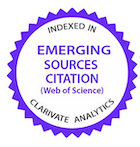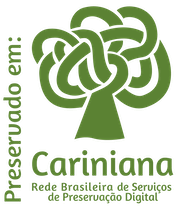Conservação e qualidade de filés de grumatã (Prochilodus lineatus) após diferentes períodos de depuração e congelamento
DOI:
https://doi.org/10.1590/1809-6891v21e-62701Resumo
O objetivo deste estudo foi avaliar as características físico-químicas, microbiológicas, sensoriais e de qualidade de carne de filés de grumatã após diferentes períodos de depuração (0, 48, 72 e 96 h) e congelamento (0, 2, 4 e 6 meses). Os peixes coletados em barragem foram distribuídos em tanques em uma densidade de 3,8 Kg m³ -1. Após os períodos de depuração todos os peixes foram filetados e as amostras de filé foram estocadas (-18°C) até serem analisadas. Menor conteúdo de gordura foi encontrado nos peixes submetidos a depuração por 48 e 96 h comparado aqueles não depurados e depurados por 72 h. Proteína muscular foi preservada nos tratamentos 48 e 96 h. Staphylococcus coagulase-positiva, coliformes a 45ºC e Salmonella spp. não foram observados nos filés, mas microorganismos mesófilos aeróbios e coliformes a 35ºC foram encontrados. A análise sensorial não demonstrou diferenças significativas nos atributos aparência, cor, textura, sabor e aceitação global. Durante o congelamento, os valores de pH, Bases Nitrogenadas Voláteis Totais (BVNT), peróxidos e Substâncias Reativas ao Ácido Tiobarbitúrico (TBARS) foram avaliados em amostras de filé a cada dois meses. Os valores de pH aumentaram após quatro meses de estocagem. Os valores de BVNT variaram nos filés dos peixes depurados por 48 e 96 h. Os valores de peróxidos aumentaram a partir do quarto mês de congelamento e no sexto mês os valores mais altos foram observados. Para TBARS, valores altos foram encontrados em filés de peixes não depurados e menores valores nos tratamentos depurados. Assim, a depuração mostrou ser mais eficiente para manter a qualidade de filés de grumatã armazenados congelados.
Palavras-chave: Off-flavor; Sabor; Odor; Oxidação lipídica; Análise sensorial.
Downloads
Referências
Soares KMDP, Gonçalves AA. Qualidade e segurança do pescado. Revista do Instituto Adolfo Lutz. 2012; 71(1):1-10. Accessed on April 03, 2019. Available from http://periodicos.ses.sp.bvs.br/pdf/rial/v71n1/v71n1a01.pdf Portuguese
» http://periodicos.ses.sp.bvs.br/pdf/rial/v71n1/v71n1a01.pdf
ICMBIO - Instituto Chico Mendes de Conservação da Biodiversidade. Boletim estatístico da pesca e aquicultura, 2011. Accessed on November 17, 2019. Available from https://www.icmbio.gov.br/cepsul/images/stories/biblioteca/download/estatistica/est_2011_bol__bra.pdf Portuguese
Varga D, Sándor Zs, Hancz Cs, Csengeri I, Jeney Zs, Papp Zs. Off flavour compounds in common carp (Cyprinus carpio L.) flesh in context of type of fish pond. Acta Alimentaria. 2015; 44(2):311-315. Accessed on May 12, 2019. Available from https://core.ac.uk/download/pdf/42945721.pdf
» https://core.ac.uk/download/pdf/42945721.pdf
Pretto A, Camargo ACS, Centenaro GS, Tamajusuku ASK, Teixeira UT, Rodrigues AT. Características sensoriais e bromatológicas da carne de Prochilodus lineatus após depuração. Caderno de Ciências Agrárias. 2017; 9(3):84-88. Accessed on January 15, 2019. Available from https://periodicos.ufmg.br/index.php/ccaufmg /article/view/2966/1799 Portuguese
» https://periodicos.ufmg.br/index.php/ccaufmg /article/view/2966/1799
Association of Official Analytical Chemists. Official Methods of Analysis, 16th ed. Washington: Association of Official Analytical Chemists. 1995. 1137p.
Bligh EG, Dyer WJ. A rapid method of total lipid extraction and purification. Canadian Journal of Biochemistry and Physiology. 1959; 37(8): 911-917. Accessed on May 18, 2019. Available from https://www.nrcresearchpress.com/doi/pdf/10.1139/o59-099
» https://www.nrcresearchpress.com/doi/pdf/10.1139/o59-099
Brasil. Ministério da Agricultura, Pecuária e Abastecimento. Instrução Normativa n° 62 de 26 de agosto de 2003. Dispõe sobre os Métodos Analíticos Oficiais para Análises Microbiológicas para Controle de Produtos de Origem Animal e Água. Diário Oficial da União. 2003 Set 18; Seção 1. Accessed on May 14, 2019. Available from http://extranet.agricultura.gov.br/sislegis-consulta/consultarLegislacao.do?operacao=visualizar&id=2851 Portuguese
Dutcoski SD. Análise sensorial de alimentos. 3nd ed. Curitiba, PR: Champagnat; 2011. 426p. Portuguese
Savay da Silva LK, Riggo R, Martins PE, Galvão JA, Oetterer M. Otimização e padronização do uso da metodologia para determinação de bases nitrogenadas voláteis totais (BNVT) em camarões Xyphopenaeus kroyeri Brazilian Journal of Food and Technology. 2008; 20(1):138-144. Accessed on February 10, 2019. Available from https://pdfs.semanticscholar.org/215a/e4fcd828abf19b1a66d7d68966ea46296a99.pdf Portuguese
» https://pdfs.semanticscholar.org/215a/e4fcd828abf19b1a66d7d68966ea46296a99.pdf
Buege JA, Aust SD. Microsomal lipid peroxidation. Methods in Enzymology. 1978; 52:302-310.
Chapman RA, Mackay K. The estimation of peroxides in fats and oils by the ferric thiocyanate method. Journal of the American Oil Chemists' Society. 1949; 26(7):360-363. Accessed on April 27, 2019. Available from https://link.springer.com/content/pdf/10.1007/BF02651444.pdf
» https://link.springer.com/content/pdf/10.1007/BF02651444.pdf
Statsoft, Inc. Statistica (data analysis software system), version 7, 2004.
Gonzaga MVM. Rendimento de carcaça e aspectos sanitários de tilapia do Nilo (Oreochromis niloticus) e catfish (Ictalurus punctatus). Alegre. Dissertação [Mestrado em Ciências Veterinárias] - Universidade Federal do Espírito Santo, Alegre; 2015. Accessed on April 18, 2019. Available from http://repositorio.ufes.br/handle/17754 Portuguese
» http://repositorio.ufes.br/handle/17754
Maia EL, Oliveira CCS, Santiago AP, Cunha FE, Holanda FCAF, Sousa JA. Composição química e classes de lipídios em peixe de água doce curimatã comum, Prochilodus cearensis Ciência e Tecnologia de Alimentos. 1999; 19(3):433-437. Accessed on May 03, 2019. Available on https://www.scielo.br/scielo.php?script=sci_arttext&pid=S0101-20611999000300025 Portuguese
» https://www.scielo.br/scielo.php?script=sci_arttext&pid=S0101-20611999000300025
Gonçalves AA. Tecnologia do Pescado. Ciência, Tecnologia, Inovação e Legislação. São Paulo, SP: Editora Atheneu, 2011. 624p. Portuguese
Malheiros S V P. Integração metabólica nos períodos pós-prandial e de jejum - um resumo. Revista de Ensino de Bioquímica. 2006; 4(1):16-22. Accessed on June 03, 2019. Available from http://bioquimica.org.br/revista/ojs/index.php/REB/article/view/20/18 Portuguese
» http://bioquimica.org.br/revista/ojs/index.php/REB/article/view/20/18
Lehninger, A L, Nelson D L, Cox M M. Princípios de Bioquímica. 4nd ed. São Paulo, SP: Sarvier, 2006. 1202p. Portuguese
Brasil. Ministério da Saúde. Agência Nacional de Vigilância Sanitária. Resolução n° 12 de 02 de janeiro de 2001. Dispõe sobre o Regulamento Técnico sobre os Padrões Microbiológicos para Alimentos. Diário Oficial da União. 2001 Jan 10; Seção 1. Accessed on June 02, 2019. Available from http://portal.anvisa.gov.br/documents/33880/2568070/RDC_12_2001.pdf/15ffddf6-3767-4527-bfac-740a0400829bPortuguese
de Oliveira PR, de Jesus RS, Batista GM, Lessi E. Avaliação sensorial, físico-química e microbiológica do pirarucu (Arapaima gigas, Schinz 1822) durante estocagem em gelo. Brazilian Journal of Food Technology. 2014; 17(1):67-74. Accessed on May 23, 2019. Available from http://www.scielo.br/pdf/bjft/v17 n1/a10v17n1.pdf Portuguese
» http://www.scielo.br/pdf/bjft/v17 n1/a10v17n1.pdf
Burr GS, Wolters WR, Schrader KK, Summerfelt ST. Impact of depuration of earthy-musty off-flavors on fillet quality of Atlantic salmon, Salmo salar, cultured in a recirculating aquaculture system. Aquaculture Engineering. 2012; 50:28-36. Accessed on May 19, 2019. Available from https://reader.elsevier.com/reader/sd/pii/S0144860912000192?token=3CDFBD66C2AADCED92928CA11198F103DB585285637D8CE2B80DFD5F83CB744EDE4B4D09CE3B47B9E2C4F0C55D2
Abbas KA, Mohamed A, Jamilah B, Ebrahimian M. A review on correlations between fish freshness and pH during cold storage. American Journal of Biochemistry and Biotechnology. 2008; 4(4):416-421. Accessed on June 02, 2019. Available from https://thescipub.com/pdf/10.3844/ajbbsp. 2008.416.421
» https://thescipub.com/pdf/10.3844/ajbbsp.2008.416.421
Karami B, Moradi Y, Motallebi AA, Hosseini E, Soltani M. Effects of frozen storage on fatty acids profile, chemical quality indices and sensory properties of red tilapia (Oreochromis niloticus × Tilapia mosambicus) fillets. Iranian Journal of Fisheries Sciences. 2013; 12(2):378-388. Accessed on June 03, 2019. Available from http://jifro.ir/article-1-996-en.html
» http://jifro.ir/article-1-996-en.html
Brasil. Ministério da Agricultura, Pecuária e Abastecimento. Decreto n° 9.013 de 29 de março de 2017. Dispõe sobre a Inspeção Industrial E Sanitária De Produtos De Origem Animal. Diário Oficial da União. 2017 Mar 30; Seção 1. Accessed on May 25, 2019. Available from http://www.planalto.gov.br/ccivil_03/_ato2015-2018/2017/decreto/d9013.htm Portuguese
» http://www.planalto.gov.br/ccivil_03/_ato2015-2018/2017/decreto/d9013.htm
Mohamed HR, El-Lahamy AA, Ibrahim SM, Hafez NE, Awad AM. Changes in biochemical criteria of tilápia fish samples during frozen storage at -18ºC for 180 days and their fried products. Journal of Experimental Food Chemistry. 2019. 5(1): 1-5. Accessed on June 05, 2019. Available from https://www.hilarispublisher.com/open-access/changes-in-biochemical-criteria-of-tilapia-fish-samples-during-frozen-storage-at-18c-for-180-days-and-their-fried-produc.pdf
Fogaça F, Sant'Ana L S. Oxidação lipídica em peixes: mecanismo de ação e prevenção. Archives of Veterinary Science. 2009; 14(2): 117-127. Accessed on May 27, 2019. Available from https://revistas.ufpr.br/veterinary/article/view/13995/11160 Portuguese
» https://revistas.ufpr.br/veterinary/article/view/13995/11160
Rezaei M, Hosseini SF. Quality assessment of farmed rainbow trout (Oncorhynchus mykiss) during chilled storage. Journal of Food science. 2008; 73(6): 93-96. Accessed on May 26, 2019. Available from https://onlinelibrary.wiley.com/doi/epdf/10.1111/j.1750-3841.2008.00792.x
» https://onlinelibrary.wiley.com/doi/epdf/10.1111/j.1750-3841.2008.00792.x
Shi L, Yin T, Xiong G, Ding A, Li X, Wu W, Qiao Y, Liao L, Wang J, Wang L. Microestructure and physicochemical properties: Effect of pre-chilling and storage time on the quality of Channel catfish during frozen storage. LWT - Food Science and Technology. 2020; 130: 109606. Accessed on July 12, 2020. Available from https://reader.elsevier.com/reader/sd/pii/S0023643820305958?F4AA3865E094E9DB0B52AECC8764D02862AAF40170A598B2F7F3C4673CAB9E59A1B9E40118
Downloads
Publicado
Como Citar
Edição
Seção
Licença
Copyright (c) 2020 Ciência Animal Brasileira

Este trabalho está licenciado sob uma licença Creative Commons Attribution 4.0 International License.
Autores que publicam nesta revista concordam com os seguintes termos:
- Autores mantém os direitos autorais e concedem à revista o direito de primeira publicação, com o trabalho simultaneamente licenciado sob a Licença Creative Commons Attribution que permite o compartilhamento do trabalho com reconhecimento da autoria e publicação inicial nesta revista.
- Autores têm autorização para assumir contratos adicionais separadamente, para distribuição não-exclusiva da versão do trabalho publicada nesta revista (ex.: publicar em repositório institucional ou como capítulo de livro), com reconhecimento de autoria e publicação inicial nesta revista.
- Autores têm permissão e são estimulados a publicar e distribuir seu trabalho online (ex.: em repositórios institucionais ou na sua página pessoal) a qualquer ponto antes ou durante o processo editorial, já que isso pode gerar alterações produtivas, bem como aumentar o impacto e a citação do trabalho publicado (Veja O Efeito do Acesso Livre).






























